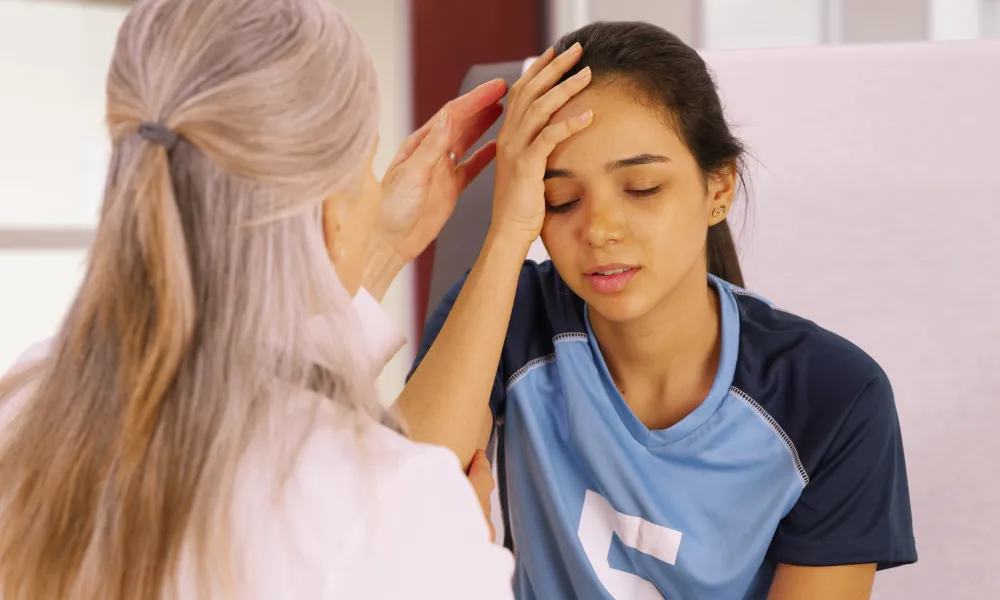
CONCUSSIONS
Request An Appointment
What is a concussion?
A concussion results from a force transmitted to the head causing impairment in neurological function. Symptoms of concussion can vary greatly depending on the individual. These include:
Physical
- Headache
- Dizziness
- Nausea
- Fatigue
- Balance Problems
- Sensitivity to light and sound
Emotional
- Irritability
- Sadness
- Nervousness
Cognitive
- Feeling slowed down
- Difficulty concentrating
- Difficulty remembering
- Feeling mentally "foggy"
Sleep
- Drowsiness
- Sleeping less than usual
- Sleeping more than usual
- Trouble falling asleep
Initial Concussion Care:
Continue brain rest guidelines while you are having symptoms. When resuming everyday life, you may notice a change or worsening of your concussion symptoms. Because these symptoms can vary greatly, your individual treatment plan is specifically for you.
The main components of care will include:
Physical rest: Maintain physical rest. It is important in concussion management because physical activity can stimulate the heart rate and increase blood flow to the brain, which can exacerbate concussion symptoms or cause them recur.
Cognitive rest: Minimize activities that require concentration and focus, including work, school, reading, or screentime (TV, video games, cell phones and computer).
Social rest: Avoid attending sporting events, spending time with friends or going to a restaurant or cafeteria for the first few days following a concussion because these activities might increase symptoms and hinder the recovery process. Other crowded or loud situations should be avoided in the first few days following a concussion if they cause an increase in symptoms.
Sleep: Stick to a consistent bedtime in a quiet room and, if naps are required, try to keep them to 20-30 minutes to maintain a normal schedule. Sleep is one of the most important ways to help heal the brain.
Diet/Hydration: Eat regularly and don't skip meals. Maintain adequate hydration by drinking plenty of water. Avoid being in the hot sun. NO ALCOHOL OR RECREATIONAL DRUGS!
Medications: Continue to take your regularly prescribed daily medication(s). Over the counter acetaminophen (Tylenol) is preferred for headache. Additional medications may be prescribed if your symptoms are severe or prolonged.
Other: Do NOT drive or operate heavy machinery until medically cleared.
Return to School:
A concussion may inhibit learning and medical clearance is required before the child may return to school. It is reasonable for a child to miss a day or two of school after a concussion, but extended absence is uncommon. Some children will need a graduated return to school program and may progress provided that there is no worsening of symptoms. Use of computers and internet should follow a similar graduated program. This program should include communication between the parents, teachers, and health professionals and will vary from child to child. The return to school program should consider:
- Extra time to complete assignments/tests
- Quiet room to complete assignments/tests
- Avoidance of noisy areas such as cafeterias, assembly halls, sporting events, music class, shop class, etc.
- Frequent breaks during class, homework, tests
- No more than one exam/day
- Shorter assignments
- Use of peer helper/tutor
- Later start times, half days, only certain classes
Return to Work:
A concussion may impact your cognitive ability to work. Depending on your job, medical clearance may be required before returning to work. It is not unusual to miss a day or two of work after concussion, but extended absence is not uncommon. A graduated return to work program may be needed in some circumstances. Avoid activities that worsen symptoms including the use of computers and internet. Return to work considerations include:
- Shortened work day
- Work from home option
- A quiet work environment with avoidance of noisy work areas
- Frequent short breaks
- Later start times
Return to Play Protocol:
There should be at least 24 hours (or longer) for each stage in the return to play/exercise progression. If symptoms recur, the athlete should rest until they resolve once again and then resume the program at the previous asymptomatic stage. Resistance training should only be added in the later stages.
Concussion Facts:
- A loss of consciousness (LOC) is NOT REQUIRED for a concussion to occur, nor does it indicate the severity of a concussion. Some concussions in which there was LOC resolve in a matter of days, while others that occurred without LOC can take several weeks to resolve.
- Helmets, soccer headgear and mouthguards CANNOT prevent concussions. No equipment exists to keep the brain from shifting within the skull. Ensuring properly fitted protective equipment and teaching proper technique are the best ways to allow an athlete to participate safely.
- Imaging studies (MRI or CT) are often not initially needed for concussion evaluation and management. Typically these studies are ordered when there is concern of skull fracture or bleeding within the brain. Occasionally these studies are ordered to look for other abnormalities in patients with prolonged symptoms.
- Studies have shown that having one concussion increases your risk for sustaining another. Multiple concussions may prolong the recovery of your most recent head injury or lead to more chronic problems. Please discuss all previous head injuries with your physician.

